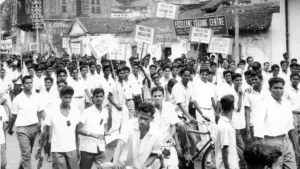Tamil Nadu is once again at the forefront of opposition against the imposition of Hindi, with the state government firmly rejecting the National Education Policy (NEP) 2020’s three-language formula. This resistance is deeply rooted in the state’s long history of anti-Hindi agitations and the preservation of Dravidian identity, dating back to the 1930s.
Historical Context: Tamil Nadu’s Anti-Hindi Agitations
Tamil Nadu has consistently opposed the imposition of Hindi, viewing it as a threat to its linguistic and cultural identity. The first major anti-Hindi agitation took place between 1937 and 1940 when the then Madras Presidency’s Congress government, led by C. Rajagopalachari, introduced compulsory Hindi education in schools. This move was met with fierce opposition from leaders like E.V. Ramasamy (Periyar) and the Justice Party, who argued that it was an attempt to undermine Tamil culture. The agitation saw mass protests, arrests, and even casualties, eventually leading to the policy’s withdrawal.

The anti-Hindi movement resurfaced in 1965 when the Indian government planned to make Hindi the sole official language, replacing English. The Dravida Munnetra Kazhagam (DMK) led widespread protests, with students and activists taking to the streets. The agitation led to violent clashes, self-immolations, and ultimately forced the central government to amend the Official Languages Act, ensuring the continued use of English alongside Hindi. This movement not only solidified Tamil Nadu’s linguistic stance but also played a crucial role in the DMK’s rise to power in 1967.

Present-Day Opposition To NEP 2020
The Tamil Nadu government, led by the DMK, has categorically rejected the NEP’s three-language policy, which mandates the study of Hindi alongside English and a regional language. The state continues to uphold its two-language formula Tamil and English arguing that it has served Tamil students well in higher education and employment opportunities. The state’s ruling party views the policy as an imposition rather than a choice, fueling renewed opposition.
மாண்புமிகு பிரதமர் @narendramodi அவர்களே…#NEP2020-ஐ முழுமையாக நடைமுறைப்படுத்தி, மும்மொழிக் கொள்கையை ஏற்றால்தான் எங்கள் தமிழ்நாட்டு மாணவர்களுக்கான #SamagraShiksha நிதி ஒதுக்கப்படும் என்பது எவ்விதத்தில் நியாயம்?
தமிழ் மக்களின் உணர்வுகளுக்கு மதிப்பில்லையா?
இருவேறு… pic.twitter.com/k1pwb9T6dT
— M.K.Stalin (@mkstalin) February 20, 2025
Union Education Minister Dharmendra Pradhan has linked the release of funds under the Samagra Shiksha scheme to the implementation of NEP 2020, leading to allegations that the Centre is using financial coercion to enforce its policies. In response, Tamil Nadu Chief Minister M.K. Stalin has reaffirmed that as long as the DMK is in power, Hindi imposition will not be allowed.
அரசியல் காரணங்களுக்காக குறுகிய பார்வையுடனும், அச்சுறுத்தலை பயன்படுத்தியும் தேசிய கல்விக் கொள்கை 2020-ஐ ஒரு மாநிலம் ஆய்வு செய்வது மிகவும் பொருத்தமற்றது.
காலத்தால் அழியாத தமிழ் கலாச்சாரத்தையும், மொழியையும் உலக அளவில் மேம்படுத்தவும் பிரபலப்படுத்தவும் மாண்புமிகு பிரதமர் நரேந்திர… https://t.co/UQtRgoONTm
— Dharmendra Pradhan (@dpradhanbjp) February 21, 2025
Voices Of Resistance From South
Karunanidhi, an office bearer of Dravidar Kazhagam, voiced strong opposition to the three-language formula, arguing that Tamil Nadu’s existing two-language policy has resulted in higher educational achievements compared to northern states. In an interview with NewsX, he stated:
“Tamil Nadu in 1967 itself adopted the two-language policy Tamil and English. This has been working well. Why should we change it? The Sangh Parivar’s agenda is not limited to imposing Hindi; through this, they want to Sanskritise education. This trick is well known to the people of Tamil Nadu. The two-language policy has enabled a higher Gross Enrolment Ratio (GER) of 50% in Tamil Nadu, compared to the northern states’ 29%. Why should Tamil Nadu go backward?”
“Will They Ensure That Tamil Is Taught In Uttar Pradesh?” Says SS Balaji
SS Balaji, MLA from the Thiruporur constituency and a prominent leader of the Viduthalai Chiruthaigal Katchi (VCK), echoed similar sentiments, accusing the NEP of perpetuating social discrimination. He told NewsX:
“If NEP is implemented, the entire educational structure will be demolished. It is designed to establish a ‘Manu Raj’ where certain sections of society are prevented from accessing education. The real purpose of NEP is to curb the rights of marginalized students. Tamil Nadu has built a strong education system with its two-language policy. Why is the Centre threatening us by withholding funds? Will they ensure Tamil is taught in Uttar Pradesh? The Tamil Nadu model has been proven successful; why can’t the Centre allow us to follow it?”
Balaji further emphasized that the opposition is not against learning Hindi but against forced imposition. “There is nothing wrong with learning a new language, but imposing one is wrong. Just as Karnataka cannot mandate compulsory Tamil learning, the Centre cannot force Hindi upon us. We respect every language, but we prioritize our mother tongue. If the Centre insists on enforcing NEP’s three-language formula, we will take legal action,” he warned.
Tamil Nadu’s Stand: A Fight For Linguistic And Cultural Autonomy
The ongoing battle over language policy in Tamil Nadu is not merely about education; it is a fight to preserve the Dravidian identity that has been fiercely defended for nearly a century. The resistance to Hindi imposition is deeply embedded in the state’s political and cultural fabric. With the DMK government standing firm and widespread support from various political and social groups, the confrontation with the Centre over NEP 2020 is expected to continue.
Tamil Nadu’s message remains clear: linguistic diversity must be celebrated, not enforced, and any attempt to impose a dominant language will be met with strong resistance. The state’s historical legacy of anti-Hindi agitations continues to shape its present, reaffirming its commitment to linguistic and educational autonomy.
ALSO READ: Baba Siddique Murder Case: Mumbai Police Investigate Key Conspirator’s Video Claiming Foreign Asylum



















